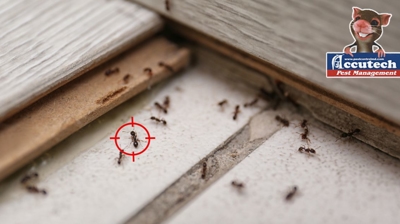Effective Rodent Control Services for Pasadena, MD Properties
There are many ways rodents in Pasadena can cause trouble. Today, we'll provide you with a quick primer for identifying rodents and evaluating the problems they may cause. We'll share effective all-natural tips to exclude them from your home and tell you how utilizing Pasadena pest control can help. If you have a current problem that is presenting an urgent need, jump to our contact page for assistance. The service team at Accutech Pest Control is happy to help!
Identifying Common Types of Rodents
There are primarily three types of rodents that enter Pasadena yards. We have lawn rodents that live in the ground and stay in the yard; groundhogs, gophers, and voles fall into this category. We have occasional invaders; squirrels and bats for example. The worst rodents in Pasadena are rats and mice. They can get inside homes and businesses and explore every inch. When they do, they can't help but cause trouble. Let's quickly look at how you can identify these potential pests.
Groundhogs: A groundhog is a mid-sized, furry rodent that looks like the offspring of a beaver and a guinea pig. A groundhog is as much as 20 inches long.
Gophers: Often confused with groundhogs, these annoying yard pests look similar but are much smaller. A typical gopher measures about eight inches in length. They also have more of a squirrel appearance.
Voles: These critters look like fat, brown mice, but you'll notice that they don't have big, perky (mouse) ears. If you have voles in your yard, you'll know it as they damage tree bark and create runways in turfgrass. These are the best way to identify voles.
Squirrels: These are furry-tailed rodents that bound across your lawn, scramble up trees, and race across powerlines. Squirrels are well-known animals and frequent daytime visitors to Pasadena yards, so more description is unnecessary. Their furry tails are their trademark feature.
Bats: If you know who Batman is, you know what a bat looks like. But you're not likely to see one clearly. They fly after the sun has set. Birds do not. Seeing something fluttering overhead at dusk or night is a bat, not a bird.
The four rodents mentioned thus far are controlled with wildlife management and trapping services in most cases. Gophers may require more serious measures beyond trapping and relocation.
Rats: We primarily have two types of rats in our area. They are Norway rats and roof rats. Norway rats are brown, and roof rats are black. Rats are stocky rodents with blunt snouts and thick tails.
Mice: We primarily have two types of mice in our area. They are house mice and deer mice. House mice are gray and deer mice have a coloration similar to deer—hence the name. These little rodents are the most annoying and pernicious of all rodent pests. Being tiny rodents, they don't require as much food as rats; this is why they can thrive in human dwellings.
Now that you know the kinds of rodents in Pasadena, let's look at what you can expect from rodents when they get into your home. We'll tie this to rodent management to prepare you for our five simple yet effective rodent-exclusion tips.
Understanding the Risks of Rodent Infestations
It is critical to have a rodent control solution because of the problems related to rodent pests. While it is impossible to keep rodents out of your yard, there are many ways to deter rodent activity. When you work to reduce the rodent population by removing attractants, you reduce the risk of property damage. When you add exclusion work, you prevent interior property damage and reduce the risk of rodent-related health issues.
- Groundhogs and gophers create holes in your yard and will likely excavate soil. Their activities in your yard will cause damage to your lawn and landscaping. They may also crack foundation slabs when they tunnel underneath.
- Voles damage trees, ornamental plants, tubers, and other vegetation. They also create pathways in your grass, which is incredibly disheartening if you work hard to maintain a beautiful lawn.
- Rats and mice spread diseases. They do this in a few ways. They ingest organisms and spread disease through their waste materials. They pick up microorganisms, such as salmonella, E. coli, and hookworms, as they move in dirty places and carry them in their fur. They pick up ticks and fleas, and these bugs also have the ability to spread diseases. They cause damage that can lead to moisture issues and black mold.
- Bats and squirrels also have the ability to spread diseases. They do so through their waste and by spreading ticks, fleas, and other parasites.
- Rats, mice, and squirrels present a fire hazard. They chew on wires and gas lines. We don't have to tell you how bad that is.
- Rats, mice, and squirrels can damage belongings stored in your attic. They gnaw on materials and soil them with their waste.
- Rats and mice explore your home and can enter your kitchen, pantry, and other spaces. As they move about, they create holes. Other pests use these holes to move about in your home.
It is best to address rodent pests as soon as you see trouble. If you have not seen rodent activity yet, there are many ways you can deter rodents and prevent a rodent problem in your yard. We will focus on rats, mice, squirrels, and bats. These are pests you may exclude. Yard rodents will only be impacted by our first tip.

Our Reputation Speaks for Itself!
Read Our Reviews
At Accutech Pest Management, customer satisfaction is not just a goal—it's our commitment. Explore reviews that showcase our dedication to exceeding expectations.
-
"Reliable, effective, and competitively priced!"
We’ve been with Accutech Pest Management for over 10 years and are completely satisfied with their service. We even purchased a plan for our daughter when she bought her home. Ron and his team are professional, courteous, and always go above and beyo
- Amy G. -
"Top-Notch Service"
I highly and sincerely recommend Accutech Pest Management - they were on time, professional, thorough, and made everything very easy on me
- Danni S. -
"Knowledgeable & Friendly Service"
The exterminator was fast and efficient. He was super informative as well and let us know exactly what to expect.
- Jay T. -
"Above and Beyond!"
Exceptional customer service like this is hard to find these days! Keep it up!
- Nicole M. -
"Great Service!"
Accutech provides top-notch service and is very reliable.
- Jeff C. -
"Highly Recommend!"
We have used Accutech for a few years now and they do not disappoint.
- Satisfied Customer -
"Prompt & Affordable Solutions"
The techs that have come out have been thorough, knowledgeable, and prompt. Customer service with all I have encountered so far has been exceptional.
- David B. -
"Repeat Customer!"
My bug and mouse problem is non-existent thanks to Accutech.
- Letha H.


.2501281605330.jpg)
